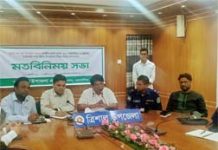C T Online Desk: Around 64.1% of respondents think the interim govt is offering greater protection to minorities than the previous administration.
A significant portion of Bangladesh’s population believes the interim government is providing better security for religious and ethnic minorities compared to the previous Awami League government, according to a recent survey by Voice of America (VOA).
The survey, conducted in late October, found that 64.1% of respondents think the interim government is offering greater protection to minorities than the previous administration. In contrast, 15.3% believe the situation has worsened, while 17.9% feel it remains unchanged.
It, however, says that the perceptions of security vary between Muslims and non-Muslims.
The poll included 1,000 respondents selected to reflect Bangladesh’s demographics. The sample was evenly split between men and women, with 92.7% identifying as Muslim. Slightly over half of the respondents were under the age of 34, and about a quarter resided in urban areas.
Initial Turmoil
After the fall of the Awami League government on August 5, religious minorities, particularly Hindus, faced a wave of violence, including attacks on homes, businesses, and places of worship.
“Attacks were motivated both by political affiliations and simply for being a minority,” said Nur Khan Liton, a human rights activist. He noted incidents such as arson attacks on Ahmadiyya communities in Panchagarh.
Highlighting the longstanding vulnerability of minorities in Bangladesh, Meenakshi Ganguly, South Asia Director at Human Rights Watch, criticised successive governments for failing to protect minority rights.
“The indigenous communities in the Chittagong Hill Tracts are deliberately marginalised, and authorities have deprived them of their rights. Hindus and Ahmadiyyas remain targets of extremist groups,” Ganguly said in an interview with VOA.
However, under the caretaker government led by Dr Muhammad Yunus, significant efforts have been made to stabilise the situation. Civil society, religious institutions, and security forces came together to protect places of worship.
“Within a month, we observed notable improvements due to collaborative efforts from the public, political parties, and religious groups,” said Nur Khan, now a member of the newly established Commission on Enforced Disappearances.
Differences in Perception
The survey revealed a divide in perceptions of safety between Muslims and minorities. Among Muslim respondents, only 13.9% felt the situation had worsened under the caretaker government. However, 33.9% of minority respondents believed their security had declined.
Jayati Sarker, a Dhaka resident and NGO worker, expressed mixed feelings. While she previously felt safe returning home late at night, she now fears venturing out even earlier in the evening. “In the past, I didn’t hesitate to return home with my daughter at 11 p.m. Now, even at 8 p.m., I feel unsafe,” she said.
Despite these concerns, some respondents acknowledged a sense of relief due to the absence of certain political elements.
“For 15 years, Awami League activists acquired Hindu-owned land at low prices or forced sales. Now, they are gone, creating a sense of relief,” Sarker added.
Hiren Pandit, a programme coordinator in Dhaka, noted improved security in rural areas due to increased military deployment but remained cautious about the future. “Our village homes were burned down, and we still live with insecurity,” Pandit said.
International Concern
The post-transition violence against minorities in Bangladesh has drawn international attention. India’s Ministry of External Affairs has consistently voiced its concerns, while US Secretary of State Antony Blinken discussed minority rights with Dr Yunus during their September 26 meeting in New York.
Donald Trump, the newly elected US President, condemned the violence in an October 31 post on social media platforms X and Truth Social. “I strongly condemn the barbaric violence against Hindus, Christians, and other minorities in Bangladesh,” Trump wrote.
Future Prospects
In an address marking the caretaker government’s 100 days, Dr Yunus attributed the violence to political motivations rather than religious tensions. “Some incidents were given a religious guise to destabilise the country further,” he said.
Human rights activist Nur Khan sees encouraging signs but emphasised the need for consistent actions over the coming months to rebuild trust within minority communities. “The sense of unease is reducing, but whether minorities can feel fully secure depends on the government’s initiatives in the next six to nine months,” Khan said.













